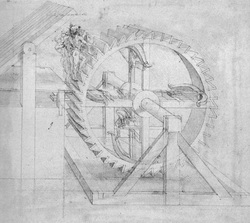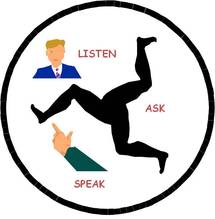 Leonardo's gears and people
Leonardo's gears and people Yes, I know, you know! We all know from kindergarten that we should listen before we talk; this is why we have two ears and only one mouth [1].
You know that if you want to be listened to you must listen before your turn. But it is difficult to do it. For me, it is against my temper, for other people it is simply forgotten or considered unimportant. This equals to neglect that people are at least as important as facts.
Something is needed to revive such weary wisdom. With this purpose, I contrived a simplified graphic tool to guide listening.
*
You are competent, you saw it all many times, it is your trade, you think with reason that you know exactly what is the illness and what the cure, you know what to do. You know what you do. You walk in and grasp the problem and the solution immediately if you did not know it even in advance. The reasonable thing for these ignorant people who are warned that you are the specialist – and even pay you for it – would be to keep quiet and listen and try to do as you say. But no, they do not listen, they interrupt with their nonsense and even push back, deny the obvious and vote truth by majority.
I lived this irritating drama of the counsellor so many times that I understood at last the need to invent this simple device, THE SMALL WHEEL, an artifice that keeps alive in my mind the way to build up credibility and to do things by listening. If you turn it into a habit, you will be paid attention when you give advice.
You actually need to listen professionally if you want to change people’s mind, because you can only change people starting from where they are. For this, you need to find out where they are, what they know already, what they miss or misunderstand, what they are prepared to comprehend and what they are ripe to accept. Without that you remain an alien, a cold stranger, shooting in the dark or boring everyone with things well known. Or confusing them with surprising things they do not relate to.
Here is how I devised to do it, which made my consultant life easier and helped me to do what I wanted to do:

I split, mentally, the time available, or each unit of advisory work, into three imaginary steps and I complete the work of each step. Listening is not natural and by itself, it is work, part of my work, and a service I give.
The Small Wheel is a rite of listening and speaking.
LISTEN
The first “third” of the time available, or of each “round” of discussion, a sizeable amount of time, I keep silent and listen. I do not speak at all.
Instead, I give all the signs of attention and interest; eye contact, attentive posture, participation-showing sitting arrangement, written notes taken or written up, all this proves that I do listen and holds attention on the subject.
If I am asked why I am silent I explain that I need and must listen first, to keep an open mind and learn the reality here, as no two situations are ever exactly the same. This explanation is readily convincing.
Deeper, the effect of listening pointedly is that after a while you are not only allowed to speak but even challenged to say something. If you are asked, this is the right time to clarify (tactfully) why you are there, what you can and cannot bring. Observe that instead of trying to speak you are asked to speak. But you should say – to end the first leg – that before giving any opinion or advice you still need to ask some questions and learn more. With this you clarified your contract.
ASK
The second “third” starts. Do not rush ahead to advice.
Now, for a reasonable while, you do a couple of important things: ask questions to clarify and to give all the present the occasion to speak. Listen (again) carefully and take notes. Acknowledge the answers and simply let people speak more while you stress the interest of what they say. Moreover you are positive, endlessly but selectively positive – you do not push back or criticize, only encourage and value, with common sense, whatever can be valued and each contribution. Your work is to catch people whenever they do something right. This behaviourist "only positive reinforcement" pulls the session in the direction you believe to be useful. This is some work in itself!
After a while there comes a point where you feel that people start to like hearing your voice, simply because you only utter positive things and validate their contribution. They are probably as ready as they will get to listen to you. This is where the third “third” starts.
SPEAK
The third turn is one where you will use your skill to communicate, teach or convince.
My preferred "pulling" manner is to say: “This reminds me…” and bring an example of what happened and worked elsewhere or to tell a story which by metaphor, by concrete image and narrative leads your small (or big) audience from where they are, what they know and understand, towards what is new and less familiar to them. Reasonably you will be heard, if the arguments, metaphors and references were adequate to the people listening and the solutions or "next steps" actionable for them.
Another useful thing I do, when possible, is to offer choices, not one solution given from outside. This way I increase their freedom and also their responsibility. I do not want people to do things just because I said so. The best will be of course to help people build their own. In that case they will become owners of my advice and they will say "We are the ones who did it." (Of course, a few, particularly dumb, will conclude that I did nothing.)
*
I do not close this rich subject. Remember that the three-legged small wheel is a start and a maintenance tool; it is there to keep turning; certainly you will shorten the “times” as adequate, but keep repeating them as you advance.
Remember also that listening well help wherever you go and whatever you do. More that work this is about life among people. Even when the situation does not encourage listening, try.
[1] Zeno of Citium said it: " This-is the reason why we have two ears and only one mouth, that we may hear more and speak less"” Life of Zeno in DIOGENES LAERTIUS,THE LIVES AND OPINIONS OF EMINENT PHILOSOPHERS, Tr. C.D. Yonge,, GEORGE BELL & SONS LONDON, 1895, p 268
 RSS Feed
RSS Feed